重庆市涪陵第十九中学八年级英语上册 Unit 3 Topic 3 Section D导学案(无答案) 仁爱版
重庆市仁爱版初中英语八年级上册Unit3 Topic3教案

【教学标题】八年级上册Unit3 Topic3【教学目标】1、通过练习进一步掌握感叹句结构,能运用解题技巧解感叹句相关题型2、复习并进一步掌握过去进行时态,熟悉并掌握该时态的时间状语3、能正确区分引导时间状语的连词when与while的区别,及until的用法【教学重点】1、when& while的区别:延续性动词(表示一段时间)【从句用进行时】when +短暂性动词(表示一个时间点)【从句用一般过去时或一般现在时】while + 延续性动词【从句用进行时】2、过去进行时的基本结构:was / were + v.-ing + 其他时间状语:at that time, at nine o’clock yesterday, from seven to nine last night, all day yesterday, at this time yesterday, at 8:15 this morning, the whole morning yesterday等。
【教学难点】please变形的不同词性及用法区别与常考结构:be pleased to do sth; be pleased with sb./sth. 【教学内容】※考点 1 when & while、until原文重现:The telephone rings while Jane is practicing the violin.On the plane from New York, Jim was playing computer games until they served the food.1.1 此处while = when 意为“当……的时候”,引导时间状语从句。
when 与while 区别延续性动词(表示一段时间)【从句用进行时】when +短暂性动词(表示一个时间点)【从句用一般过去时或一般现在时】延续性动词【从句用进行时】Eg. While / When I was having supper, someone knocked at the door.When you leave the room, please turn off the lights.1.2until “直至;直到”(主句用延续性动词)not ... until ... “到……时候才”(主句用短暂性动词)【过手练习】1. Tom was watching TV _______ his father came back.A. whileB. asC. whenD. and2. Now many young people _______ go to bed _______ ten o'clock every night.A. don't; untilB. not; untilC. didn't; untilD. /; until3. Newton was playing under an apple tree _______ an apple fell onto his head.A. whenB. whileC. afterD. before※考点 2 pleasant/agree原文重现:I think classical music is pleasant.I don’t agree. I agree with you.2.1pleasant 形容词“令人愉快的,舒适的”辨别:please 动词,“请;使高兴”pleasant 形容词,作定语时,意为“令人愉快的”,一般用来修饰事物;作表语时,句子的主语一般是事物。
八年级上册英语第三单元TOPIC3知识点
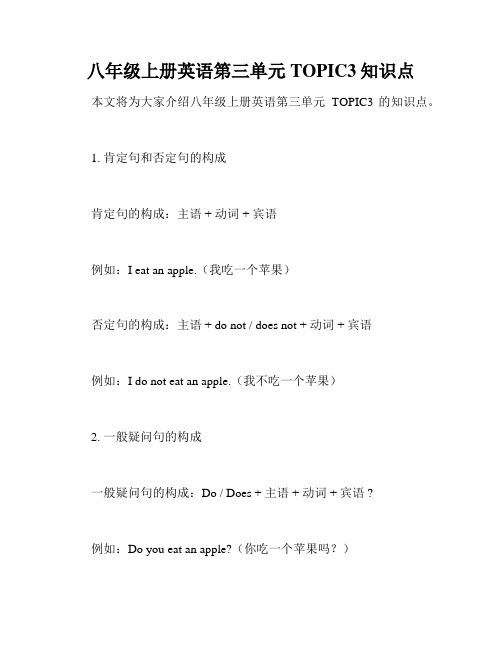
八年级上册英语第三单元TOPIC3知识点本文将为大家介绍八年级上册英语第三单元TOPIC3的知识点。
1. 肯定句和否定句的构成肯定句的构成:主语 + 动词 + 宾语例如:I eat an apple.(我吃一个苹果)否定句的构成:主语 + do not / does not + 动词 + 宾语例如:I do not eat an apple.(我不吃一个苹果)2. 一般疑问句的构成一般疑问句的构成:Do / Does + 主语 + 动词 + 宾语 ?例如:Do you eat an apple?(你吃一个苹果吗?)3. 询问时间和地点询问时间的句型:What time is it? / What’s the time?例如:What time is it now?(现在几点了?)询问地点的句型:Where is the school?例如:Where is the school?(学校在哪里?)4. 询问对象和人物的句型询问对象的句型:Who / Whom + 动词 + 宾语 ?例如:Who is your English teacher?(你的英语老师是谁?)询问人物的句型:What + be / do / have + 主语 ?例如:What is your father’s name?(你爸爸叫什么名字?)5. 日常交际用语1) 问候语:Hello,Good morning / afternoon / evening.2) 道别语:Goodbye,See you later,Bye.3) 感谢语:Thank you,Thanks.4) 道歉语:Sorry,Excuse me.6. 数字和时间的表达数字的表达:One,two,three,four,five,six,seven,eight,nine,ten.时间的表达:例如:7:00(seven o’clock),7:05(five past seven),7:10(ten past seven),7:15(quarter past seven),7:20(twenty pastseven),7:25(twenty-five past seven),7:30(half past seven),7:35(twenty-five to eight),7:40(twenty to eight),7:45(quarter to eight),7:50(ten to eight),7:55(five to eight)。
重庆市涪陵第十九中学九年级英语上册 Unit 3 Topic 3 Section C练习题
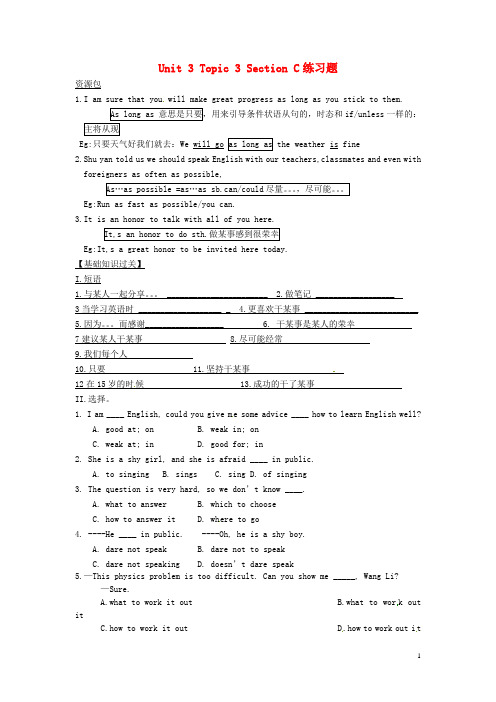
Unit 3 Topic 3 Section C练习题资源包1.I am sure that you will make great progress as long as you stick to them.if/unless一样的:Eg:只要天气好我们就去:We will go as long as the weather is fine2.Shu yan told us we should speak English with our teachers,classmates and even with foreigners as often as possible,Eg:Run as fast as possible/you can.3.It is an honor to talk with all of you here.Eg:It,s a great honor to be invited here today.【基础知识过关】I.短语1.与某人一起分享。
_______________________2.做笔记 __________________3当学习英语时 ___________________ _ 4.更喜欢干某事 __________________________ 5.因为。
而感谢__________________ 6. 干某事是某人的荣幸7建议某人干某事 8.尽可能经常9.我们每个人10.只要 11.坚持干某事12在15岁的时候 13.成功的干了某事II.选择。
1. I am ____ English, could you give m e some advice ____ how to learn English well?A. good at; onB. weak in; onC. weak at; inD. good for; in2. She is a shy girl, and she is afraid ____ in public.A. to singingB. singsC. singD. of singing3. The question is very hard, so we don’t know ____.A. what to answerB. which to chooseC. how to answer itD. where to go4. ----He ____ in public. ----Oh, he is a shy boy.A. dare not speakB. dare not to speakC. dare not speakingD. doesn’t dare speak5.—This physics problem is too difficult. Can you show me _____, Wang Li?—Sure.A.what to work it outB.what to wor k out itC.how to work it outD.how to work out i t6.It is important _____ the piano well.A.of him to playB.for him to playC.of him playingD.for him to playing7.—Sorry, I can’t follow you. I beg your pardon?—_____A.You are welcome.B.That’s all right.C.Not at all.D.No problem.8.The old farmer felt like _____ a big house very much.A.to getB.getC.gettingD.got9.She _____ walk at night. How brave she is!A.dare toB.dares toC.dare notD.doesn’t dare to10.I will go to my doctor for _____ on healthy diet (饮食).A.an adviceB.some advicesC.any adviceD.s ome pieces of advice11.It’s my honor _____ to give a talk here.A.to inviteB.to be invitedC.invitingD.invite12.I usually go to the movies with my parents, but _____ alone.A.some timesB.sometimeC.at timesD.at time13.If you want to learn English well, i t’s useful to _____ before class and _____ after class.A.review; previewB.preview; reviewC.review; to previewD.preview; to review14.Listening, speaking and reading are all important _____ writing.A.besideB.besidesC.exceptD.expect【综合能力提升】I.根据汉语补充句子。
重庆市第三十九中学八年级英语上册 Unit 3 I’m more outgoing than my
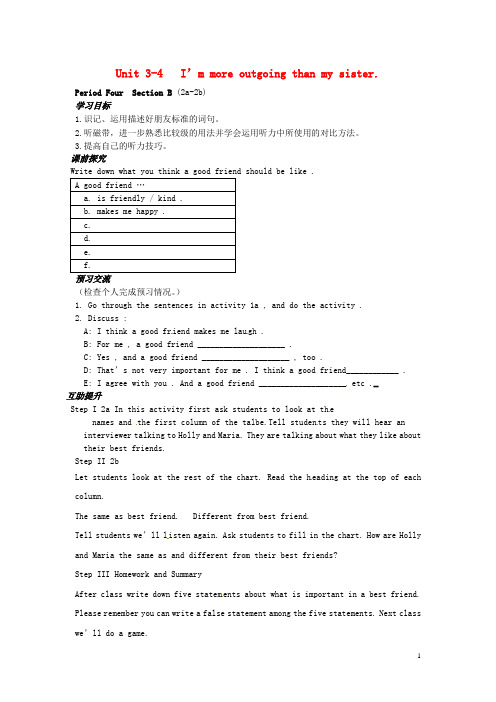
Unit 3-4 I’m more outgoing than my sister.Period Four Section B (2a-2b)学习目标1.识记、运用描述好朋友标准的词句。
2.听磁带,进一步熟悉比较级的用法并学会运用听力中所使用的对比方法。
3.提高自己的听力技巧。
课前探究Write down what you think a good friend should be like .A good friend …a. is friendly / kind .b. makes me happy .c.d.e.f.(检查个人完成预习情况。
)1. Go through the sentences in activity 1a , and do the activity .2. Discuss :A: I think a good fr iend makes me lau gh .B: For me , a good friend ____________________ .C: Yes , and a good friend ____________________ , too .D: That’s not very important for me . I think a good friend____________ .E: I agree with you . And a good friend ____________________ etc ._互助提升Step I 2a In this activity first ask students to look at th enames and the first column of the talbe.Tell studen ts they will hear an interviewer talking to Holly and Maria. They are talking about what they like about their best friends.Step II 2bLet students look at the rest of the chart. Read the h eading at the top of each column.The same as best friend. Different from best friend.Tell students we’ll l isten again. Ask students to fill in the chart. How are Holly and Maria the same as and different from their best friends?Step III Homework and SummaryAfter class write down five statem ents about what is important in a best friend.Please remember you can write a false statement among the five statements. Next class we’ll do a game.体验成功一.单项选择1. Lucy is very short, but she is ______ than her sister.A. shorterB. longerC. tallerD. older2. Frank is __________ friendly than his brother.A. a little moreB. a few moreC. muchD. a little3. Sam is __________ at Chinese than Jim.A. goodB. wellC. betterD. gooder4. This one is too large. Can you show me a __________one?A. largerB. largeC. smallD. smaller5. —Do you think March is ________ than January?—Yes, it’s __________ warmer.A.better, a littleB. well, muchC. worse, veryD. nicer, quite二.make用法小结1. 当make的意思是“做、制造、制作”时,常用的句型是:(1) make sth. (to do sth.)意为“制造某物”。
重庆市涪陵第十九中学八年级英语上册 Unit 3 Topic 3 Section A导学案(无答案) 仁爱版

Unit 3 Topic 3 Section A导学案一、学习目标:1、重点词汇及短语2、初步学习过去进行时的构成3、了解重点句型及交际用语。
二、学习重难点1.了解过去进行时的构成。
一、自习自疑(一)重点词汇I.看第135页P71-72的新单词,试拼读,并小组内相互拼读。
II.熟记并默写。
1.回答,答案2.淋浴3.端上,服务4.消息5.博物馆6.鸭子7.聊天 8.烤的二. 在文中划出下列短语并翻译1.洗淋浴 ____________2.请稍等 ____________3.打电话叫某人做某事 ____________4.接电话 ____________5.练小提琴____________6.等电话____________7.打扫卫生 ____________ 8.和朋友聊天 ____________9.从七点到九点_________________ 10.听新闻_____________________11.吃北京烤鸭__________________ 12.参观博物馆_____________________13.种树_________________三.写出下面重点句子1.请稍等! ____________2.你正在干什么? ___3.我正在练小提琴. ___4.昨天这个时候你正在干什么? ___ 我正在洗澡。
_______________5.我打电话叫你去英语角,但没人听。
___6.北京是他最喜欢的城市之一。
________________________________________________四. 知识链接1.What were you doing at this time yesterday?此句是一个过去进行时。
过去进行时表示过去某一具体时刻或某一段时间正在发生或进行的动作。
过去进行时的肯定句结构:主语+were/was+动词的现在分词+其他。
昨天早上九点她正在做卫生。
译:_________________________________________________过去进行时的一般疑问句结构:were/was+主语+动词的现在分词+其它?昨天早上九点她在做卫生吗?译:_______________________________________________过去进行时的特殊疑问句结构:特殊疑问词+一般疑问问?昨天早上九点她在做什么?译:_________________________________________________过去进行时的常用时间状语:at this time yesterday,at that time,at nine o’clockyes terday,from seven to nine last night,all day yesterday.yesterday和last night既可用于一般过去时也可用于过去进行时。
八年级英语上册Unit3 Topic 3 Section C湘教版
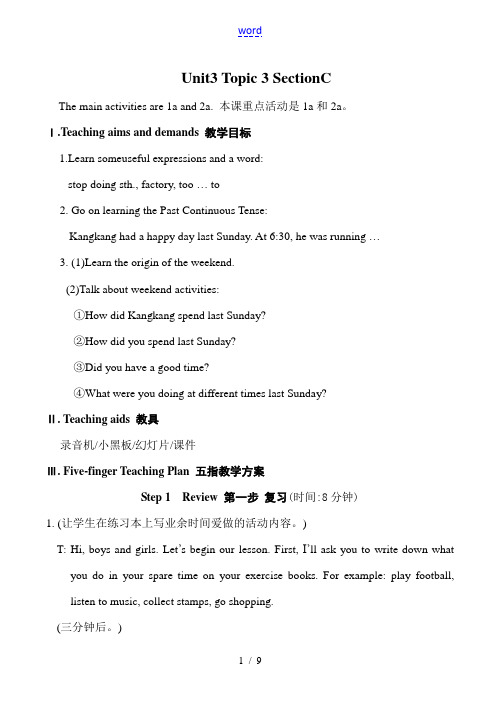
Unit3 Topic 3 SectionCThe main activities are 1a and 2a. 本课重点活动是1a和2a。
Ⅰ.Teaching aims and demands 教学目标1.Learn someuseful expressions and a word:stop doing sth., factory, too … to2. Go on learning the Past Continuous Tense:Kangkang had a happy day last Sunday. At 6:30, he was running …3. (1)Learn the origin of the weekend.(2)Talk about weekend activities:①How did Kangkang spend last Sunday?②How did you spend last Sunday?③Did you have a good time?④What were you doing at different times last Sunday?Ⅱ. Teaching aids 教具录音机/小黑板/幻灯片/课件Ⅲ. Five-finger Teaching Plan 五指教学方案Step 1 Review 第一步复习(时间:8分钟)1. (让学生在练习本上写业余时间爱做的活动内容。
)T: Hi, boys and girls. Let’s begin our lesson. First, I’ll ask you to write down what you do in your spare time on your exercise books. For example: play football, listen to music, collect stamps, go shopping.(三分钟后。
重庆市涪陵第十九中学八年级英语上册 Unit 3 Topic 2
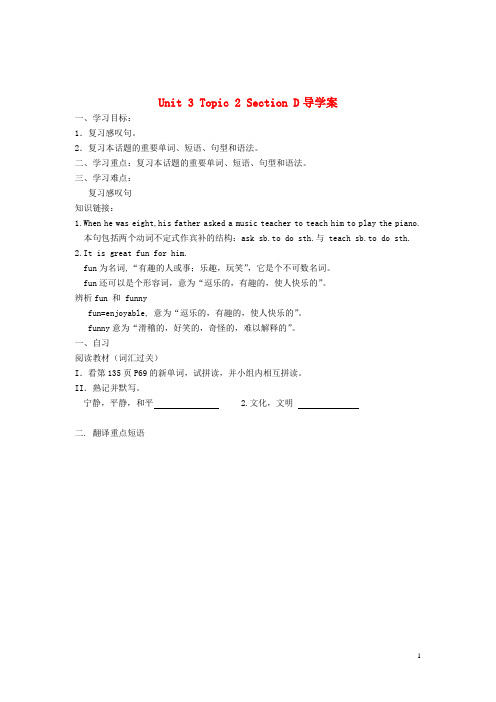
Unit 3 Topic 2 Section D导学案一、学习目标:1.复习感叹句。
2.复习本话题的重要单词、短语、句型和语法。
二、学习重点:复习本话题的重要单词、短语、句型和语法。
三、学习难点:复习感叹句知识链接:1.When he was eight,his father asked a music teacher to teach him to play the piano. 本句包括两个动词不定式作宾补的结构:ask sb.to do sth.与 teach sb.to do sth.2.It is great fun for him.fun为名词,“有趣的人或事;乐趣,玩笑”,它是个不可数名词。
fun还可以是个形容词,意为“逗乐的,有趣的,使人快乐的”。
辨析fun 和 funnyfun=enjoyable, 意为“逗乐的,有趣的,使人快乐的”。
funny意为“滑稽的,好笑的,奇怪的,难以解释的”。
一、自习阅读教材(词汇过关)I.看第135页P69的新单词,试拼读,并小组内相互拼读。
II.熟记并默写。
宁静,平静,和平 2.文化,文明二. 翻译重点短语1.各种各样的_________________2.带给人们舒适_________________________3.心灵的平静4.要求某人做某事5.不同的人有不同的品味6.教某人做某事____________________7.讨厌做某事___________________8.喜欢做某事_______________ ___________________9.太吵了__________ 10.使某人快乐_______________11.最喜欢……________________12.不同的音乐________________________ 13.一点也不……_______________________14.受欢迎的___________________三. 翻译文中重点句子1.音乐使人快乐。
重庆市第三十九中学八年级英语上册 Unit3 What are you doing for vaca

重庆市第三十九中学八年级英语上册 Unit3 What are you doing for vacation?Section B(1a-2c)导学案(无答案)人教新目标版【课前探究】1、基础导航1)在课文中划出下列新词汇:bike, ride, sightseeing, fishing, rent, Italy…并根据上下文猜测出生词的含义,试着朗读。
2) 完成P16, 1a 并翻译go bike riding __________________ go sightseeing ______________________ take walks=(__________________), __________go fishing ___________________ rent videos _______________________2、自主探究:1) 如果你是记者,你要采访一个名人关于他、她度假的情况,请列一个问题清单(至少三个问题)。
_______________________________________________________________________________ _______________________________________________________________________________ ______________________________________________________________________________ 2)角色表演:把上面的问题和搭档表演出来。
A: Hello! Can I ask you a few questions about your vacation plans?B: Yes.A:…?…3) 在P86课文中找出下列表达:Lives of the Very Famous magazine 名人杂志下个假期_______________ 意大利南部_________________________别的什么__________________ 那听起来很棒________________________【互助提升】1、预习情况交流:2、综合技能训练1:Pairwork1) 朗读1a。
重庆市涪陵第十九中学八年级英语上册 Unit 3 Topic 3

Unit 3 Topic 3 Section B导学案一、学习目标:1.进一步学习过去进行时。
2.学会表达赞成与否定。
3.加强交际用语的运用。
二、学习重难点:、1.进一步学习过去进行时。
2. 学会表达赞成与否定。
一、自学自疑(一)词汇过关I.看第135页P73-74的单词,试拼读,并小组内相互拼读。
II.熟记并默写。
1.同意,应允 2、勇敢的 3.有用的,有益的4.令人愉快的5.一般阅读教材一. 写出下面动词的过去式二. 在文中划出下列短语并翻译1.看电影2.同意某人3.一般_______________ 3太严肃_________________4.你说得很对_____________________三、在文中划出重点句子并翻译1.它不有趣吗?_______________________________2、我同意你的看法。
_______________________________3、我并不这么认为。
_______________________________4、我认为古典音乐很悦耳。
_______________________________5、我并不了解。
_______________________________三. 知识链接1.watch a movie=see a film “看电影”,与其相关的固定短语有:go to the cinema/movie/theater 去电影院,watch TV 看电视,watch a ball game 看球赛。
2.agree 是不及物动词,意为“同意,应允”agree with sb.“同意或赞成某人的观点”。
agree on sth. = agree about sth.“同意某事”。
agree to do sth.“同意做某事”。
agree + that 从句,“为某事见解一致,承认某事”。
3.pleasant adj.意为“令人愉快的”,其名词形式为pleasure,意为“愉快”,动词形式为please,意为“使……快乐”。
重庆市涪陵第十九中学八年级英语上册 Unit 3 Topic 3 Section D导学案(无答案) 仁爱版
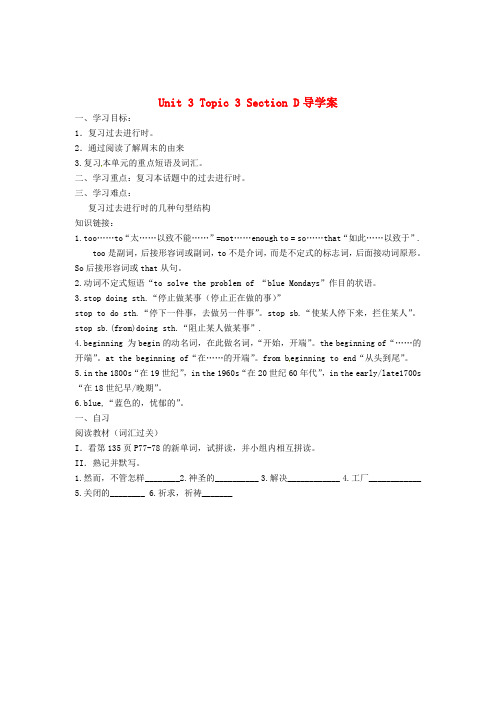
Unit 3 Topic 3 Section D导学案一、学习目标:1.复习过去进行时。
2.通过阅读了解周末的由来3.复习本单元的重点短语及词汇。
二、学习重点:复习本话题中的过去进行时。
三、学习难点:复习过去进行时的几种句型结构知识链接:1.too……to“太……以致不能……”=not……enough to = so……that“如此……以致于”. too是副词,后接形容词或副词,to不是介词,而是不定式的标志词,后面接动词原形。
So后接形容词或that从句。
2.动词不定式短语“to solve the problem of “blue Mondays”作目的状语。
3.stop doing sth.“停止做某事(停止正在做的事)”stop to do sth.“停下一件事,去做另一件事”。
stop sb.“使某人停下来,拦住某人”。
stop sb.(from)doing sth.“阻止某人做某事”.4.beginning 为begin的动名词,在此做名词,“开始,开端”。
the beginning of“……的开端”。
at the beginning of“在……的开端”。
from b eginning to end“从头到尾”。
5.in the 1800s“在19世纪”,in the 1960s“在20世纪60年代”,in the early/late1700s “在18世纪早/晚期”。
6.blue,“蓝色的,忧郁的”。
一、自习阅读教材(词汇过关)I.看第135页P77-78的新单词,试拼读,并小组内相互拼读。
II.熟记并默写。
1.然而,不管怎样________2.神圣的__________3.解决____________4.工厂____________5.关闭的________6.祈求,祈祷_______二. 翻译1在19世纪前 _________________ 2.去教堂 _________________________3.过得愉快4.感到太累以致于不能工作5.为了解决这个问题6.停止工作_________________7.至到1930年_____________三. 翻译文中重点句子1.然后,他们感觉太累以至于每个周一的早晨都不能去工作。
重庆市涪陵九中八年级英语上册《Unit 3 Topic 3 Section A》课件 仁爱版
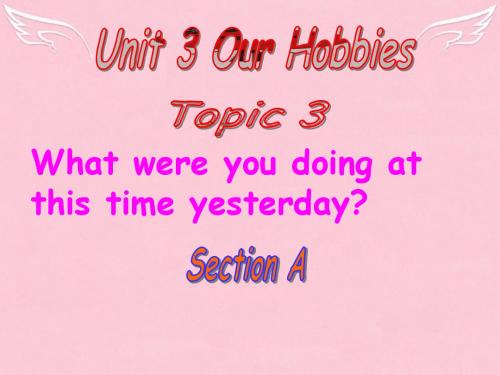
B: I was learning English.
Were you playing computer games? A: Yes, I was. / No, I wasn’t.
ห้องสมุดไป่ตู้xample:
A: What were you doing from seven to nine yesterday ? B: I was learning English. Were you playing computer games?
过去进行时
hold the line answer the phone at this time yesterday take a shower go to the English Corner take a shower at that time wash some clothes do some washing
I know some useful expressions.
I know some
I can write a passage with the past continuous tense.
telephone languages.
1.Make a telephone dialog according to the telephone languages. 2.Finish the exercise related in Section A of the worksheet.
1a
Listen, look and say.
视频1a-P71
Listen to 1a and choose the correct answer.
• --What was Jane doing at that time yesterday? B • --She was __________ .
- 1、下载文档前请自行甄别文档内容的完整性,平台不提供额外的编辑、内容补充、找答案等附加服务。
- 2、"仅部分预览"的文档,不可在线预览部分如存在完整性等问题,可反馈申请退款(可完整预览的文档不适用该条件!)。
- 3、如文档侵犯您的权益,请联系客服反馈,我们会尽快为您处理(人工客服工作时间:9:00-18:30)。
Unit 3 Topic 3 Section D导学案一、学习目标:1.复习过去进行时。
2.通过阅读了解周末的由来3.复习本单元的重点短语及词汇。
二、学习重点:复习本话题中的过去进行时。
三、学习难点:复习过去进行时的几种句型结构知识链接:1.too……to“太……以致不能……”=not……enough to = so……that“如此……以致于”. too是副词,后接形容词或副词,to不是介词,而是不定式的标志词,后面接动词原形。
So后接形容词或that从句。
2.动词不定式短语“to solve the problem of “blue Mondays”作目的状语。
3.stop doing sth.“停止做某事(停止正在做的事)”stop to do sth.“停下一件事,去做另一件事”。
stop sb.“使某人停下来,拦住某人”。
stop sb.(from)doing sth.“阻止某人做某事”.4.beginning 为begin的动名词,在此做名词,“开始,开端”。
the beginning of“……的开端”。
at the beginning of“在……的开端”。
from b eginning to end“从头到尾”。
5.in the 1800s“在19世纪”,in the 1960s“在20世纪60年代”,in the early/late1700s “在18世纪早/晚期”。
6.blue,“蓝色的,忧郁的”。
一、自习阅读教材(词汇过关)I.看第135页P77-78的新单词,试拼读,并小组内相互拼读。
II.熟记并默写。
1.然而,不管怎样________2.神圣的__________3.解决____________4.工厂____________5.关闭的________6.祈求,祈祷_______二. 翻译1在19世纪前 _________________ 2.去教堂 _________________________3.过得愉快4.感到太累以致于不能工作5.为了解决这个问题6.停止工作_________________7.至到1930年_____________三. 翻译文中重点句子1.然后,他们感觉太累以至于每个周一的早晨都不能去工作。
译:___________________________________________________________2.为解决“忧郁星期一”这个问题,1874年,英国人把星期六下午作为假日。
译:___________________________________________________________3.一点钟,大家都停止工作了。
译:___________________________________________________________4.这就是周末的想法在英国的开始。
译:___________________________________________________________我想问:_________________________________________________________________________________________________________________________________________________________________________________家长签字_________________预习等级__________________组长签字__________________ 二、自主探究活动一:review,and then finish the grammer and functions.Read the passage and do it.活动二:write a passage ,finish 2.Work plete the project.三、自测I.单项选择( )1.---What does your mo ther do?---She is a worker.She makes clothes in a ______A.shopB.bankC.libraryD.factory( )2.---Could you help me to______this problem?---Sure.What’s it?A.solveB.workC.makeD.ask( )3.I think Harry Potter is a wonderful movie._____,my friend,Li Ping desen’t think so.A.SoB.OrC.AndD.However( )4.Jack had a busy day.He was______tired to do anything in the evening.A.veryB.tooC.soD.quite( )5.It’s 12:00 o’clock.Let’s ______and go for lunch.A.stop workingB.stop to workC.start workingD.start to workII.根据汉语提示完成句子。
1.我的父亲出生在20世纪50年代。
My father was born_____ _______ ______.2.这个箱子太重,我搬不动它.This box is______heavy for me_______carry.3.请不要弹琴了,我在工作。
Please______ ______the piano.I’m working now.4.我不知道怎么解决这个难题。
I don’t know how to______ ______ ______.5.昨天这个时候你在做作业吗?______you______your homework at this time yesterday?四、自结我想说:_________________________________________________________________________________________________________________________________________________________________________________六、课后作业I.阅读理解I have a two-day holiday every week.I don’t have any lessons on Saturday or Sunday.So every weekend I have a good time.On weekends,I like taking a trip.I sometimes go to the country with my c lassmates by bus to breathe(呼吸)the fresh air,watch the green hills and the blue sea,and walk in the beauty of the countryside.Sometimes I go for a picnic in the open air with my friends by bike.There we draw pictures and take photos.Sometimes I go to visit a place of interest with my parents by car.Sometimes on Saturday,I take a long trip with my parents.We don’t go home at night and make a fire on the hill.We sit around it,singing and dancing happily.If we feel tired.we sit together ,look at the stars and chat for a long time,and then s leep for a few hours.My weekends are always full of pleasure.阅读短文,回答下列问题。
1.Why do es the writer have a good time every weekend?____________________________________________________________2.What does the word “beauty”mean in Chinese?____________________________________________________________3.How does the writer go for a picnic?______________________________________________________________ 4.If the writer and his parents feel tired,what do they do?________________________________________________________________ 5.How do you think the writer’s weekends?__________________________________________________________。
